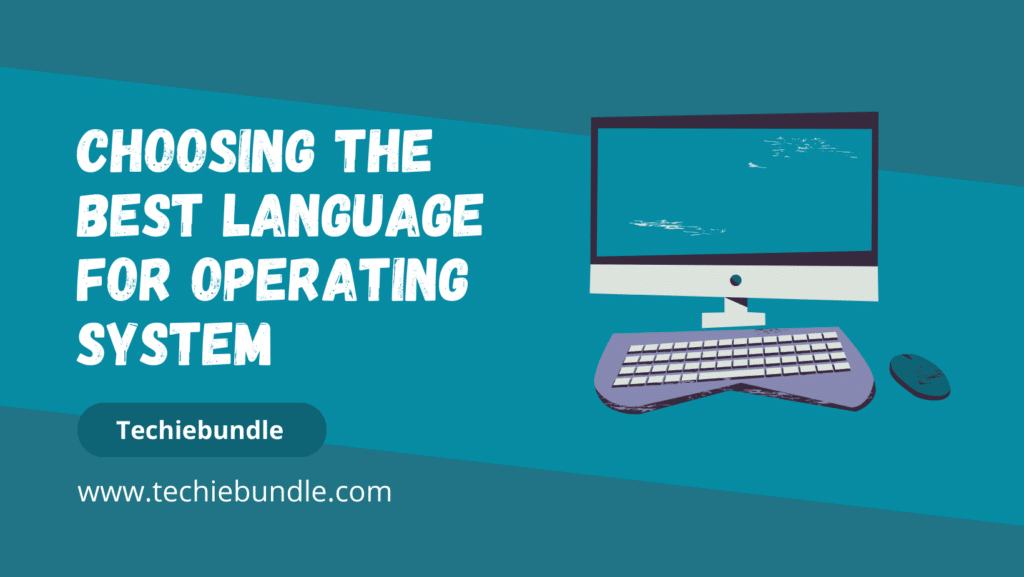Introduction: Best Language for Operating System
The development of operating system (OS) is like the foundation of modern technology. These complex systems help manage computer hardware, allow you to use your computer, and make sure your apps run smoothly. When creating an operating system (OS), one of the most important choices is picking the right programming language to build it. This decision can really affect how well the operating system (OS) works, how safe it is, and how easy it is to maintain.
In this article, we’ll look at what factors you should think about when choosing the best language for operating system, and we’ll explore some of the common programming languages used for this job.
Key Considerations
Performance:
When it comes to operating systems, one of the most important things is making sure they run fast and smoothly for users. To do this, developers often like to use low-level languages like C and C++. These languages let the operating system talk directly to the computer’s hardware and manage resources really efficiently. That means the OS can handle tasks quickly without any unnecessary delays.
Security:
Operating systems are often targeted by security threats, so it’s vital to use a language that has strong security features. Memory safety is a big deal because certain vulnerabilities, like buffer overflows, can make the whole system vulnerable. Rust, a systems programming language, has become popular because it’s really good at keeping memory safe. It enforces strict rules right from the start, which helps prevent common security problems, making it a great choice for building operating systems.
Portability:
Today’s computing setups are quite varied, and when OS developers create their systems, they have to think about making them work on different platforms. The language they choose should make it easy to do this. While C and C++ are good at this, newer languages like Rust and Go offer a more up-to-date way of writing code that can be adapted to various hardware and platforms without too much trouble.
Maintainability:
Building and maintaining an OS is a long-term commitment, and the choice of language can significantly impact the ease of maintenance. High-level languages like Python or Java are good for readability and developer efficiency, but they aren’t commonly used for the core parts of an operating system because they might not be as fast or secure. To strike a balance, many developers use a combination of languages. High-level languages are great for user applications, while low-level languages are better suited for the kernel and device drivers.
Commonly Used Languages for Operating System Development
1. C Language
For several decades, C language has been the preferred language for building operating systems. It offers a strong level of control over hardware resources, is highly efficient, and is compatible with various computer architectures. Notable examples of successful operating systems developed in C language include the Unix and Linux kernels.
2. C++
C++ extends the capabilities of C by introducing features like object-oriented programming. Although C++ is not as commonly used as C in the development of operating systems, it is still employed in specific projects. For instance, the Windows NT kernel incorporates C++ for certain sections of its codebase.
3. Rust
Rust is a systems programming language that prioritizes memory safety in its design. Its rigorous checks at compile-time and its focus on secure concurrent operations make it a compelling option for building operating systems. A notable illustration of an operating system crafted in Rust is the Redox OS.
4. Assembly Language
In certain crucial sections of an operating system, developers may turn to assembly language. This language provides the highest level of control over hardware resources. It’s not typically used for the entire operating system, but it finds application in specific tasks that demand precise control.
[ You might also like: Top 10 Best Computer Courses to Boost Your Career ]
Conclusion
Choosing the best language for operating system is a complex decision that depends on a combination of factors, including performance, security, portability, and maintainability. While C and C++ languages are traditionally favored for OS development due to their efficiency and control, alternatives like Rust are becoming popular because of their enhanced memory safety features.
Ultimately, the choice of language should align with the specific needs and goals of the operating system (OS) project. Many developers opt for a hybrid approach, combining both high-level and low-level languages. This pragmatic approach helps address the diverse challenges faced in operating system (OS) development.
Regardless of the language chosen, it is essential for operating system (OS) developers to stay current with best practices and evolving security concerns to ensure the long-term success of their projects.



